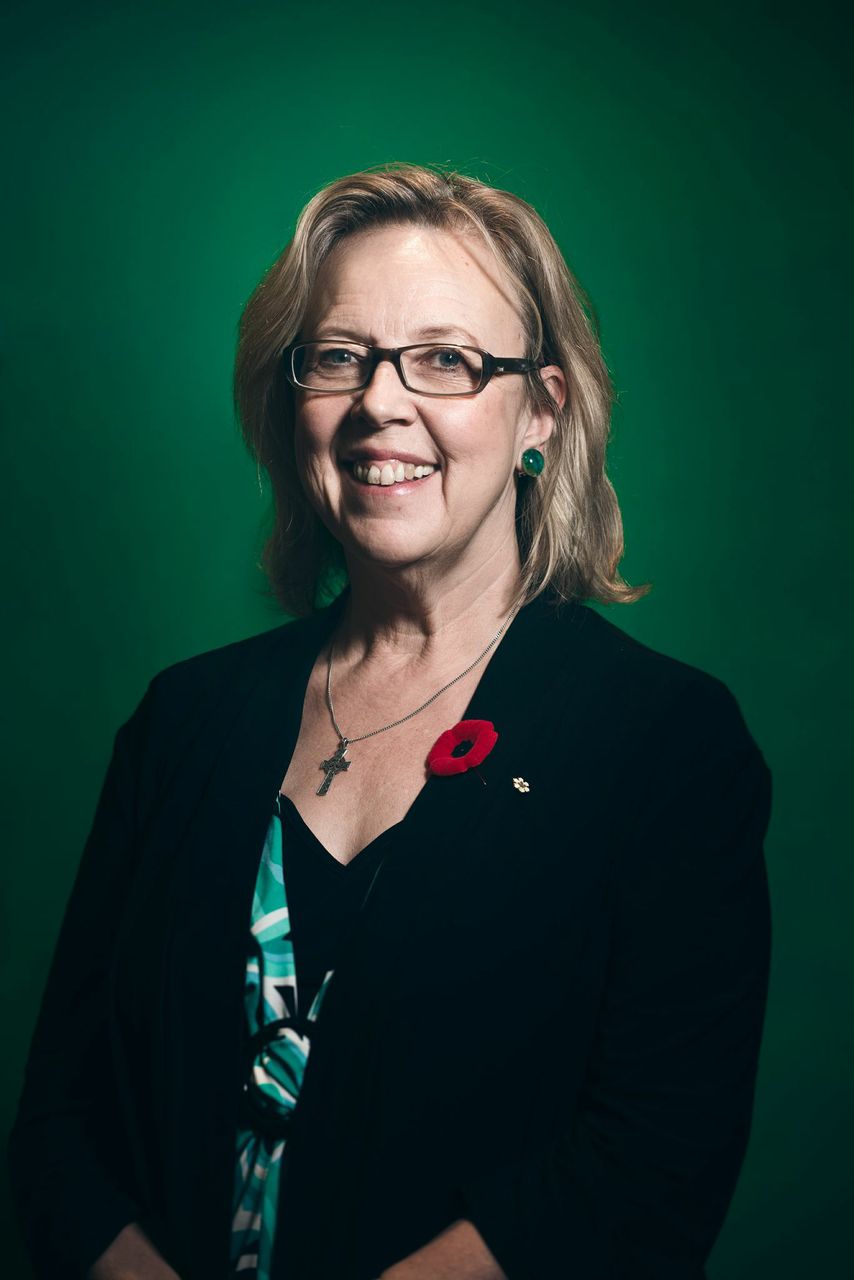Elizabeth May on the approaching juncture between democratic change and ruin
Green Party Leader Elizabeth May stopped by McGill University on Saturday, Nov. 8 to speak about her latest book Who We Are: Reflections on My Life and reflect on Canadian democracy, world climate and the next election.
The Concordian had the opportunity to speak one-on-one with the social activist, and environmentalist. Below is a part of our interview. It has been condensed and reordered for readability.
The Concordian: Canada is rapidly becoming an economy dependant on the export of raw resources. What has this meant for Canada?
Elizabeth May: I have to say [resource dependence has] been the result of failed policies, and the focus on bitumen production has seen a weak case of Dutch disease that’s reduced employment opportunities for Ontario and Quebec. That’s not entirely due to tying the dollar to a barrel of bitumen, but it sure hasn’t helped. As our dollar rose, a lot of jobs were lost in traditional manufacturing and export-based industries, as well as our tourism industry. The resource-based industry is both evolutionary and manipulated by certain policies: [Prime Minister] Stephen Harper has favoured one industry above all others, which is basically fossil fuels, particularly bitumen.
C: The centre is shifting from Quebec and Ontario to the western part of the country. Provinces there, especially Alberta, are particularly tied and dependent on petrochemical exploitation and raw resources for growth. How does this bode for the Green Party’s fortunes?

EM: The fortunes of the Green Party are, I think, national, not regional. We’ve just elected our first member of parliament in New Brunswick, and he defeated the Conservative Energy Minister [Craig Leonard] and the top issue [there] was fracking. We’ve also elected our first member to the B.C. legislature in 2009, who’s one of Canada’s leading climate scientists; the issues were climate, pipelines, and oil tankers.
The Green message is resonating in Alberta, and that’s because Albertans are also concerned about conservation. You can’t make assumptions that Alberta represents a certain type of person anymore. Those assertions were never right. The land ethic in Alberta runs very deep. Farmers and ranchers as much as young, savvy, professionals want a concrete plan on climate change.
Our message gets across anywhere to the extent [that] we are able to command political space in the field. During the last elections, the mainstream media virtually ignored the Green Party. If we can be noticed enough … it will change our electoral fortunes everywhere. I think we are going to have a breakthrough in the next elections.
C: What do you think this determined drive for oil says about our country?
EM: We’re going for the last barrel. We’re scraping, we’re going for fracking and bitumen, and this is what happens when you get desperate. It’s time to really start looking at what kind of economic opportunities Canada has that’s not specifically geared to fossil fuels, a push away from regional resource models.
C: You say in your book that there is no inherent conflict between the economy and the environment. Could you explain a bit more?
EM: Capitalism is in the way, but only because we’ve allowed corporate rule, we’ve allowed the notion that the profits of multinationals are more important than the health, sustainability, and resilience of Canadian communities.
All sorts of statistics show when you ramp up environmental protection, competitiveness improves, productivity improves, [research and development] improves. The stronger your environmental policies, the stronger your economic performance. But it has to be driven by government policy, because without guidance, industries will always have to hedge for the outlier laggard in any sector that wants to make profits cheaper.
C: You also call upon pragmatic governance, but simultaneously point out these huge companies have never enjoyed as much influence and power. How can you pragmatically expect to fetter organizations that will refuse to yield and are at the apogee of their power?
EM: This is why Canadian citizens, and citizens from [all] over the world, will have to work a lot harder at this. We’re not bystanders to this. Students at Concordia are not bystanders to corporate rule. We are enablers to corporate rule when we don’t step up and say ‘this is what’s happening.’
Voting is the least of it. Explaining, educating, reaching out so that Canadians understand these issues before the next election, putting maximum pressure … we have to make citizens aware [that] we’re in a serious struggle.
Ursula Franklin said that we live in an occupied state. We’re occupied by multinational corporations. If the occupiers were soldiers stationed on every street corner, I think we would have formed a resistance to that by now. But because it’s the friendly face of corporations whose products we buy because we’re relatively comfortable and consumer culture breeds passivity, we’re not organizing a resistance.
I think that the tools of fundamental democracy are all the resistance we need—I’m certainly not calling on anybody to break the law! The tools that we have in the law-abiding, non-violent use of our democratic rights to demand governments pay attention to things that really matter—we’re not really using that. The largest voting bloc in the last election were the people who didn’t vote. I know there are many reasons why people decided to not vote, but citizen disengagement is the key enabler of corporate rule. As long as we act like we have no power, it’s a self-fulfilling prophecy.
C: Is this more of an election fight, or a generational struggle?
EM: Because of the climate crisis we’ve got to make significant progress the next election—we’ve got to have a globally inclusive [climate] treaty by 2015, which is the deadline for negotiating the next climate treaty that takes effect by 2020.
It is a generational struggle in the sense that [we have] to nail this now and really recover democratic governance, repair social safety networks, get rid of the notion you can’t have a single discussion on any issue in public policy before first bowing down to the idea that unlimited economic growth must be the underpinning. That’s going to be a longer struggle than one election. But let’s start naming the problem now, and engage more people.
C: What do you see as the state of Canadian political system right now?
EM: Stephen Harper is the first prime minister who’s written off entire regions of the country because he figures he can get enough votes here or there. It’s all an electoral calculation rather than a public policy meant to be of greatest benefit to the most people. This is a deliberate calculated manipulation of public opinion and shared values [and] common assumptions. We can still repair our laws, so we can have engaged citizens.”
C: Politics is compromise. How will the Green Party compromise?
EM: I don’t really believe in compromise on the key issues that really matter, but it’s figuring out [things] in the context of governing. It’s important to stop having politics on the basis of division, the so-called wedge issue and the politics of slicing-and-dicing issues, that’s not healthy in terms of holding a country together. What can we do collectively as a country to change the fact we waste half the energy we currently use? What employment opportunities are there for energy efficiency, conservation, demand-side management, building retrofits? There are a lot of opportunities for having a healthier, more prosperous Canada. All these things can happen, but they won’t happen when you have a system where politicians work through fear and division and not consensus. You use the word compromise, I use the word consensus that will take everybody’s interests into account.
Elizabeth May’s book, Who We Are: Reflections on My Life, is now on sale and can be purchased hardcover on Amazon.ca for about $19.




